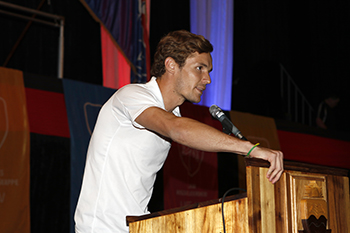Latest News Archive
Please select Category, Year, and then Month to display items
31 January 2024
|
Story EDZANI NEPHALELA
|
Photo ANJA AUCAMP
 Dr Martin Laubscher’s thesis, crowned with the Andrew Murray-Desmond Tutu Prize, is testament to the university’s unwavering commitment to scholarly excellence.
Dr Martin Laubscher’s thesis, crowned with the Andrew Murray-Desmond Tutu Prize, is testament to the university’s unwavering commitment to scholarly excellence.
In a historic triumph that reverberates over four decades since its inception, the UFS has clinched the coveted
Andrew Murray Prize – now renamed the Andrew Murray-Desmond Tutu Prize – for the first time. Standing shoulder to shoulder with institutions such as the University of Pretoria (UP) and Stellenbosch University (SU), this achievement marks a significant milestone in the UFS’ journey.
At the heart of this accomplishment lies the profound contribution of
Dr Martin Laubscher, distinguished Senior Lecturer specialising in Practical and Missional Theology in the
Faculty of Theology and Religion. Dr Laubscher’s dedication and scholarly prowess culminated in the groundbreaking work titled
Publieke teologie as profetiese teologie? (Public theology as prophetic theology), a revised edition of his doctoral thesis, which was originally crafted at Stellenbosch University in 2020, with a focus on the eminent Karl Barth.
Dr Laubscher received the Andrew Murray Prize for Theological Books in Afrikaans for his research and insightful analysis. The journey started when he realised, under the guidance of his study leader,
Prof Dion Forster, that his script had the potential to be published in Afrikaans. Sun Media’s interest in publishing this work in Afrikaans, led to it being the first-ever published thesis in Afrikaans. Dr Laubscher recalls, “I was grateful and excited about Sun Media’s interest. The book emerged within a year, and during a celebratory launch Prof Forster suggested I submit it for the Andrew Murray Prize.”
Earlier this year, Dr Laubscher was excited to learn that he was being shortlisted for the prestigious award. Reflecting on the significant moment, he shares, “The elation I felt upon receiving the news was unparalleled. I was not only celebrating a personal triumph, but also etching my name as the first laureate from our faculty to secure this prestigious accolade.”
I don’t see myself as a star, says Wayde
2016-09-20

The achievements of Wayde van Niekerk and his
fellow Kovsie athlete, Rynardt van Rensburg,
at the Olympic Games, were celebrated during
a celebration ceremony for them on
15 September 2016 in the Callie Human Centre.
Photo: Johan Roux
The environment surrounding him has changed a lot over the past few weeks, but Wayde van Niekerk doesn’t see himself as superstar. The 400 m Olympic champion is embracing being back home and is feeling the love of the Kovsie family that helped him reach great heights.
“I see this (the Bloemfontein Campus) as a place where I can find peace,” the University of the Free State (UFS) athlete said at a celebration ceremony on 15 September 2016 for him and fellow Olympian, Rynardt van Rensburg. The event celebrated their achievements after participation in the Olympic Games in Rio de Janeiro, Brazil. Their coaches, Tannie Ans Botha and Derek van Rensburg, were also honoured.
Van Niekerk looks ahead
“I am always excited to get back home,” Van Niekerk said. Everybody who means something to him is in Bloemfontein and on this campus. “I thank you for believing in me. I am only 24 years old and still have quite a few years left to keep on doing what I do.” He also conducted the official opening of the new KovsieFit gymnasium in the Callie Human Centre.
According to Prof Nicky Morgan, acting Vice-Chancellor and Rector, the attendees had “Wayde fever”. “We can’t really say thank you enough – at least for the association we have had with you (Van Niekerk) over the years.”
Rynardt didn’t expect best in Rio
“I see this (the Bloemfontein Campus)
as a place where I can find peace.”
Van Rensburg reached the semi-finals in Rio and ran a personal best of 1:45.33 in the 800 m. “If we don’t have support, we won’t be able to do this,” he said.
Although his form was improving prior to the Olympics, he didn’t expect to run a personal best. “My dad (and coach) kept believing in me and telling me it is possible to do.”